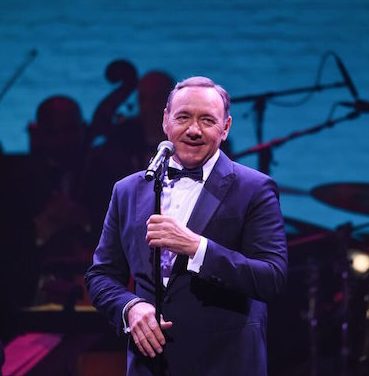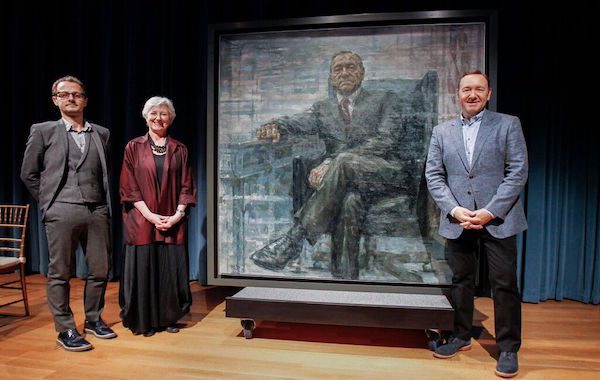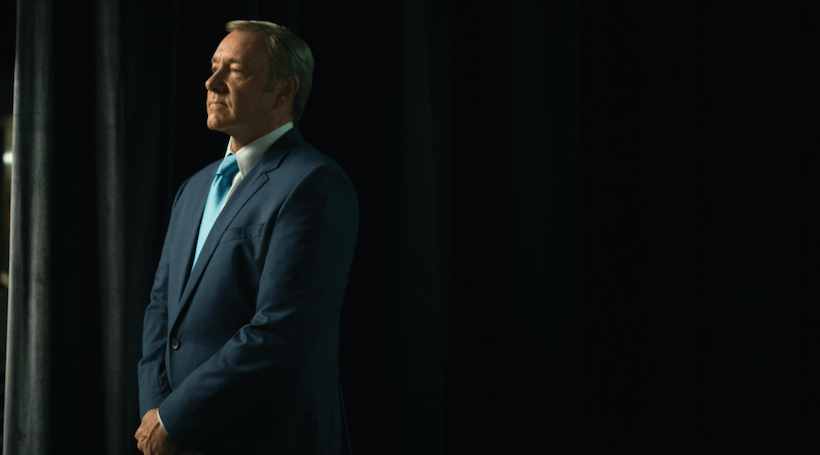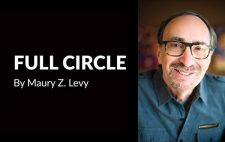Photo: David Giesbrecht
It’s not just that Kevin Spacey is Hollywood royalty and has been since the late ’80s. It’s not that he can seemingly create a hit film or television show just by lending his name to the project. It’s not his worldwide legions of adoring fans or even his long history of royal roles: kings, presidents and powerful men. Kevin Spacey has an extraordinary ability to command an audience, both from the stage and from the screen. In ways that defy explanation, he just seems presidential.
Last month, the North Jersey native, who got his theatrical start in New Jersey dinner theaters, returned to his role as the dastardly politician Frank Underwood in Season 5 of the Netflix original series “House of Cards.”
When the show’s first season premiered on Netflix, it almost immediately – and irrevocably – altered the way we think about television. Spacey and the show’s creators set out to do something untraditional, and they succeeded.
“We went and we pitched the idea to all of the networks, and every network thought it was a really interesting idea. Every network was engaged and wanted to do it with us, but every network insisted that we do a pilot, except one,” Spacey says. “[Netflix] did their remarkable analytics and had a sense audiences would dig something that was a political drama. Netflix said, ‘No, we don’t need you to do a pilot; how many do you want to do?’ And we said, ‘Uh… two seasons?’ It was the worst negotiation ever.”
The fifth season of House of Cards premiered last month to a fandom that continues to grow exponentially. Spacey, whose character ascended from ambitious majority whip to the presidency over the first four seasons, is famously tight-lipped about the show.
“I can’t talk about any of the specifics in the show, and people get frustrated by that,” he says. “But I say I can’t be the spoiler-in-chief, because there are people who, this year, are just now discovering season one.”
Spacey did a huge amount of research to become Frank Underwood. He shadowed real politicians, some of whom, he says, think the show’s drama and political misdeeds are “closer to the truth than anyone would like to know.”
In fact, House of Cards has had eerie moments of parallel with the real political happenings of America over the past few years. Spacey often jokes that the show is forecasting the future.
“I know people think we rip this off from the headlines, but it’s the other way around,” he says. “We write something, we’ve shot it and then it happens in real life. This is my belief – and I’ve joked about this a lot – but I’d like to think it’s possible: If we write something we actually want to happen, it might actually happen outside of the show. So we want to write an episode where $985 billion gets put into the arts budget, and let’s see if we can make that happen.”

Kevin Spacey in “100: The Apollo Celebrates Ella.” Photo: Shahar Azran
Joking aside, Spacey is a very political person. He’s a personal friend of Bill Clinton, given large sums to political causes and joined street protests to combat threats to democracy in foreign nations.
Despite his long involvement in the political realm and his talent for sidestepping questions he doesn’t want to answer, Spacey is no politician – he just plays on one TV. He had a masterful turn as President Richard Nixon in 2016’s “Elvis & Nixon,” and he hasn’t ruled out more presidential roles in the future.
“I hope to have a few more presidents. I can certainly do impressions of Clinton. I probably have a Roosevelt in me,” he says.
Spacey’s ability to convincingly transform himself into a character – whether it be fictional or historical – is well documented. His is the familiar face fans loved in “American Beauty,” “The Usual Suspects” and “Seven.” Younger audiences recognize his voice from Pixar’s “A Bug’s Life,” and video gamers know his likeness from “Call of Duty: Advanced Warfare.”
The 57-year-old actor has a long and varied resume, but “bonafide movie star” has always been right there at the top. In 2003, though, Spacey stepped away from the bright lights of Hollywood and announced he was moving to London, where he’d accepted the position of artistic director at The Old Vic, one of the city’s oldest theaters.
“When I made the decision to move to London to start a theater company to do a play or two every year for what became a 12-year stretch, I was at a place where I wanted to challenge myself in a different way than I had been challenging myself in film. I didn’t want to fall into making a lot of movies I probably shouldn’t make, and I wanted to become a better actor,” Spacey told Peter Travers on his show “Popcorn.”
“I had focused on building my career for about 10 or 12 years, and it had gone better than I could have hoped,” Spacey says. “I didn’t want to spend another 10 years pursuing the same dream. I had done what I set out to do, and I wanted to be challenged on a different level. Then, lo and behold, The Old Vic fell into my lap. The idea of returning to the theater and running a company was so engaging and exciting that I never saw it as walking away from something; I saw it as walking toward something, even though at the time a lot of people thought I was f***ing out of my mind. What’s been really satisfying is that maybe I don’t look so crazy anymore.”
(Another thing about Kevin Spacey: he drops a lot of F-bombs.)
Before The Old Vic, Spacey was no stranger to the stage. He won a Tony Award in 1991 for his Broadway turn in “Lost in Yonkers,” and – lest it go unmentioned – he’s a graduate of The Juilliard School.
But at The Old Vic, Spacey had the opportunity to focus – for more than a decade – on honing and perfecting his art. He produced, directed and starred in productions of modern and Shakespearean classics. He took on the comedy of “The Philadelphia Story” and the drama of “Inherit the Wind.” He also played kings: Shakespeare’s Richard II, and, to rave reviews and a worldwide tour, Richard III.
“The decade at The Old Vic made me a better actor,” Spacey says. “To work with the actors I worked with, the kind of parts I did, the fact that you get up every single night and you can get better – for an actor like myself, who learns so much from the doing, the act of being watched, the changes you go through when you learn about a character and about yourself and about the audience every night – I know I would never have been prepared to take on the role of Frank Underwood 12 years ago.”
Decades into a stellar career, Spacey remains a student: of Shakespeare, the stage, politics and history. He’s determined to guide the next generation of students, too. He’s a patron of the “Shakespeare Schools Festival,” which gives children in the U.K. the opportunity to perform Shakespeare in professional theaters, and he founded The Kevin Spacey Foundation with the singular goal of helping talented young artists find success in the world of entertainment.

Artist Jonathan Yeo; Brandon Brame Fortune, the National Portrait Gallery’s chief curator, and Kevin Spacey unveil a portrait of Spacey as President Frank Underwood. Photo: Paul Morigi/Netflix
“It’s incredible to help young people find their own self-esteem and voice and learn collaborative skills,” he says. “But it’s funny – when you tell them something that’s been passed down to you, some lesson you learned a long time ago, often, in the act of saying it, you think, ‘Oh my God. I needed to hear that. It’s really important, and I haven’t been doing it myself.’”
“I recently did a master class with 20 emerging actors over two days, about three and a half hours each day, and there must have been at least a dozen times that happened,” Spacey says. “I look at these young people and see myself. I know what they’re going through. I understand their desire and ambition and all the questions they have. No matter what happens in my life, no matter what success I achieve, I don’t want to ever be out of touch with that.”
Whatever success he’s achieved, Spacey hopes the pinnacle of his career is still a way off.
“The films I’m proudest of are the ones I think will stand the test of time,” he says. “I feel incredibly blessed, but I also am of a mind that when people ask me, ‘What’s your favorite film you’ve ever done,’ my hope is that I haven’t done it yet. I hope it’s ahead of me and not behind me. What’s exciting is that in my business, you don’t know what’s next until it’s presented to you or you decide to create it. All I know is that I don’t want to do what I’ve done before.”














